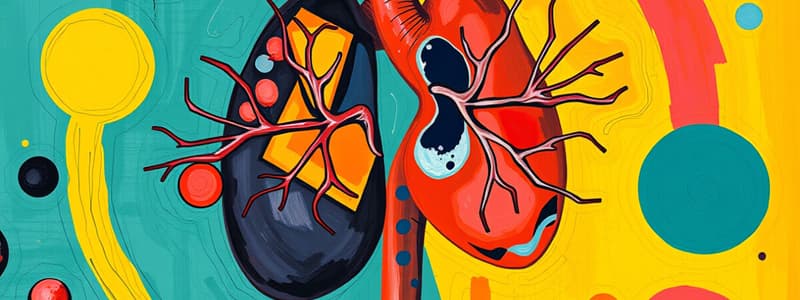Podcast
Questions and Answers
What is angina pectoris?
What is angina pectoris?
Chest pain that occurs when the heart's supply of blood carrying oxygen is insufficient to meet the demands of the heart.
What is angina?
What is angina?
An imbalance of oxygen supply and demand.
Which type of angina is caused by a chronic narrowing usually due to atherosclerosis?
Which type of angina is caused by a chronic narrowing usually due to atherosclerosis?
- Chronic stable angina (correct)
- Unstable angina
- Vasospastic angina
- None of the above
What are the three main classes of drugs used to treat angina pectoris?
What are the three main classes of drugs used to treat angina pectoris?
What are the three main therapeutic objectives of antianginal drugs?
What are the three main therapeutic objectives of antianginal drugs?
What is the overall goal of antianginal drug therapy?
What is the overall goal of antianginal drug therapy?
What are Nitrates/Nitrites mainly used for?
What are Nitrates/Nitrites mainly used for?
What is a common adverse effect of Nitrates/Nitrites?
What is a common adverse effect of Nitrates/Nitrites?
What should patients do to avoid tolerance to Nitrates/Nitrites?
What should patients do to avoid tolerance to Nitrates/Nitrites?
Which of the following is NOT a contraindication to the use of Nitrates/Nitrites?
Which of the following is NOT a contraindication to the use of Nitrates/Nitrites?
What should a patient do if sublingual nitroglycerin (Nitrostat) pain is not relieved in 5 minutes?
What should a patient do if sublingual nitroglycerin (Nitrostat) pain is not relieved in 5 minutes?
How many mg of Isosorbide dinitrate (Isordil) can a patient take sublingually?
How many mg of Isosorbide dinitrate (Isordil) can a patient take sublingually?
What is the dosage range for Isosorbide mononitrate (Imdur)?
What is the dosage range for Isosorbide mononitrate (Imdur)?
What should Nitro-Bid IV be used with?
What should Nitro-Bid IV be used with?
What is important in the patient education for Nitrostat?
What is important in the patient education for Nitrostat?
How should Nitro-dur transdermal patches be applied?
How should Nitro-dur transdermal patches be applied?
Study Notes
Angina Overview
- Angina pectoris refers to chest pain resulting from the heart's insufficient blood supply.
- Angina represents an imbalance between oxygen supply and demand in the heart.
Types of Angina
- Chronic stable angina: Caused by atherosclerosis; occurs predictably with exertion and usually subsides within 15 minutes.
- Unstable angina: Acute and can lead to myocardial infarction; may occur at rest.
- Vasospastic angina (Prinzmetal): Results from coronary artery vasospasm; can occur unexpectedly at rest.
Antianginal Drugs
- Three main classes include:
- Nitrates/Nitrites
- Beta blockers
- Calcium channel blockers
Therapeutic Objectives
- Minimize frequency and intensity of angina attacks.
- Improve patient functional capacity with minimal side effects.
- Prevent or delay myocardial infarction.
Goals of Therapy
- Increase blood flow to ischemic myocardium and reduce myocardial oxygen demand.
Nitrates/Nitrites
- Primary treatment for angina; increases blood supply and decreases demand.
- Common formulations include:
- Nitroglycerin
- Isosorbide dinitrate
- Isosorbide mononitrate
Mechanism of Action
- Nitrates act on vascular smooth muscle to dilate veins and arteries, reducing preload and enhancing coronary artery dilation.
Indications
- Effective for all forms of angina: stable, unstable, and vasospastic.
- Long-acting forms intended for prophylaxis; rapid-acting forms for acute attacks.
Contraindications
- Allergy and hypotension.
- Increased intracranial pressure and certain drug interactions (e.g., erectile dysfunction medications).
- Conditions such as anemia and closed-angle glaucoma.
Adverse Effects
- Common effects include headaches, orthostatic hypotension, reflex tachycardia, and dizziness, typically diminishing with use.
Tolerance Management
- Rapid tolerance can develop, especially with high doses; manage by using the lowest effective dose and incorporating an 8-hour nitrate-free period.
Drug Interactions
- Interactions noted with alcohol, anti-hypertensive medications, and erectile dysfunction treatments.
Specific Nitrates
- Isosorbide dinitrate (Isordil): Available sublingually and orally, with dosing instructions emphasizing gradual introduction and storage in a cool place.
- Isosorbide mononitrate (Imdur): Sustained-release formulation for constant drug concentration; oral only.
- Nitro-Bid IV: Used for continuous infusion, requires special administration equipment.
- Nitrostat: Sublingual formulation for acute attacks; rapid onset, short duration.
- Patient education for Nitrostat includes taking it at the onset of pain and knowing when to seek emergency help.
Additional Formulations
- Nitro-dur: Transdermal patch applied to non-hairy areas.
Patient Education Highlights
- For sublingual nitroglycerin: take at pain onset, call 911 if pain persists after two doses, allow the tablet to dissolve under the tongue, and properly store the medication.
Studying That Suits You
Use AI to generate personalized quizzes and flashcards to suit your learning preferences.
Description
Test your knowledge on antianginal drugs and angina pectoris with this flashcard quiz! Cover key concepts such as types of angina, oxygen supply and demand imbalance, and more. Perfect for students studying pharmacology and related healthcare fields.

